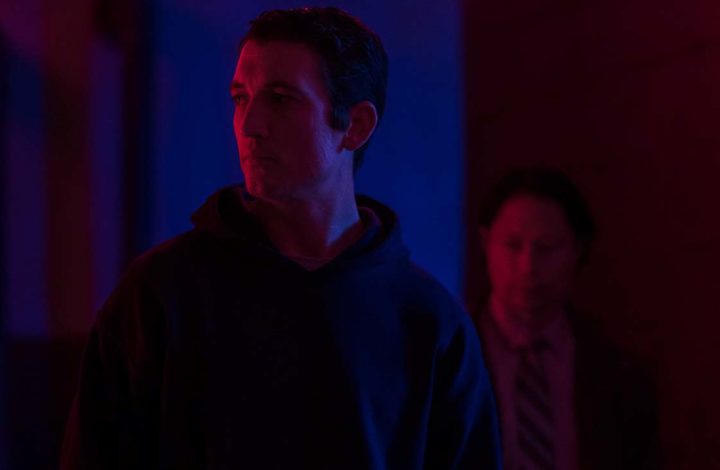
MPAA Rating: NR | Rating: ★½
Release year: 2019
Genre: Crime, Film Noir Director: Nicolas Winding Refn
“Do you like what you see?” the young woman asks the stoic Martin Jones (Miles Teller), an LA homicide detective with a knack for violence. Martin offers little in the way of response; he might as well be a shadow in the darkness of the dank hotel room. The teenager—we later learn her name is Janey (Nell Tiger Free) and she is the daughter of a billionaire—removes her blouse and lies prone on the bed. Martin then stoops down to his hands and knees, and crawls slowly towards her with the gait of a stalking feline. There is dead silence. The entire scene takes what feels like ages.
Thus describes the opening moments of Too Old To Die Young, Danish filmmaker Nicolas Winding Refn’s new TV series for Amazon. Dimly-lit neon-drenched dreck, the two episodes I saw presented at Cannes look and feel like a bad David Lynch parody, with none of Lynch’s oddities, humor, or appreciation of both the grotesque and the spiritual. Instead, we are presented terse, opaque dialogue performed at a snail’s pace and in deadpan tones. Imagine reading…
A review…which…
Felt as… disjointed…
As…
This.
And you’ll have a small sense of the forbearance required to endure Refn’s depraved slog. Indeed, this is supposed to be a 13-hour TV series, but it’s hard to imagine the audience for this kind of slow-paced neon-noir nightmare. It was unclear as to which episodes these were, but I imagine they emerged from somewhere in the middle, as we were plopped in media res into Refn’s bleary world. If mainstream American audiences found Refn’s Drive to be dull (a sentiment I don’t share—I love that film), they’ll likely be browsing their Amazon watchlist within moments.
Too Old To Die Young centers on Martin and his escapades as a wandering assassin of America’s underbelly. Teller is a talented actor, but he feels totally out of place here. Some actors can do the brooding silent type well (like Ryan Gosling in Refn’s Drive and Only God Forgives), but when Teller is reduced to an expressionless guy in a suit or hoodie, he comes across not as intriguing or menacing, but soulless. Martin is sometimes accompanied by his one-eyed fellow hitman, Viggo (John Hawkes), a lanky former FBI agent who uses anything from knives to guns to golf clubs to wipe out the filth from modern American society. In a lengthy monologue given overlooking the glimmering LA valley at night, Viggo describes how humanity has overcome and destroyed nature, splitting the atom and thus reality itself. “The more perfect society gets, the more psychotic we have become,” he drones on to a vacuous Martin. So people like Viggo and Martin, as well as an enigmatic mystical handler (Jena Malone—IMDb credits her as “Diana”), have to take care of this psychotic societal infection any way possible.
The society Refn reveals does seem to be psychotic and depraved, but if Refn is making a statement about American culture, it’s lost in the jumble of puzzling and perverse scenes. Women’s bodies are paraded and mutilated with an unsettling misogyny, both on- and off-screen. The graphic violence comes in short, brutal bursts. The second episode focuses on Martin hunting two pornographers, brothers who make rape films—they’re the kind of guys who kidnap women and bury them alive in the desert, or enjoy filming three men gang rape a teen boy. It’s not pleasant stuff, but Refn seems to revel in it all without offering much meditation on the perversion’s source or its remedy. There is no true justice in this imagined world. The police station where Martin works has a bizarre pep talk where the lieutenant sings a song with his ukulele consisting of three phrases—Jesus, Mary, The Baby—and getting the officers to join him in a rousing chant of “Fascism! Fascism! Fascism!” Again, this isn’t Lynchian in that Refn doesn’t appear to have any sense of sympathy or empathy for any of these characters, nor are there moments of sweetness or levity. It’s dark and dour, all the way down; nearly every scene is at night or in dark basements and warehouses, usually bathed in the pink, purple, and red neon lights Refn seems obsessed with. When some scenes finally occur during the day in the New Mexico desert, the color palette is harsh and oversaturated—there is no visual respite here. The synth-filled soundtrack hums and thumps periodically, while scenes dissolve and overlap one another in a dreamlike daze.
When Too Old To Die Young isn’t vapid, it’s repulsive. In my scribbled notes from the Cannes screening, I can clearly discern two underlined words: perverse and yuck. I think I wrote this during a drawn-out scene (truly, they’re all drawn-out scenes) of one of the porno brothers hosing down a lingerie-clad young woman while she stands against the wall of a filthy neon-lit shower. He just stares at her, hose in hand, spraying the water up and down while she stands, limbs akimbo, exposed and used. We are forced to stare too, helpless to do anything. Except we aren’t helpless—it’s a streaming TV show. If we don’t like what we see, we can simply watch something else.
IMDB Listing: https://www.imdb.com/title/tt6517320/
Leave a Reply